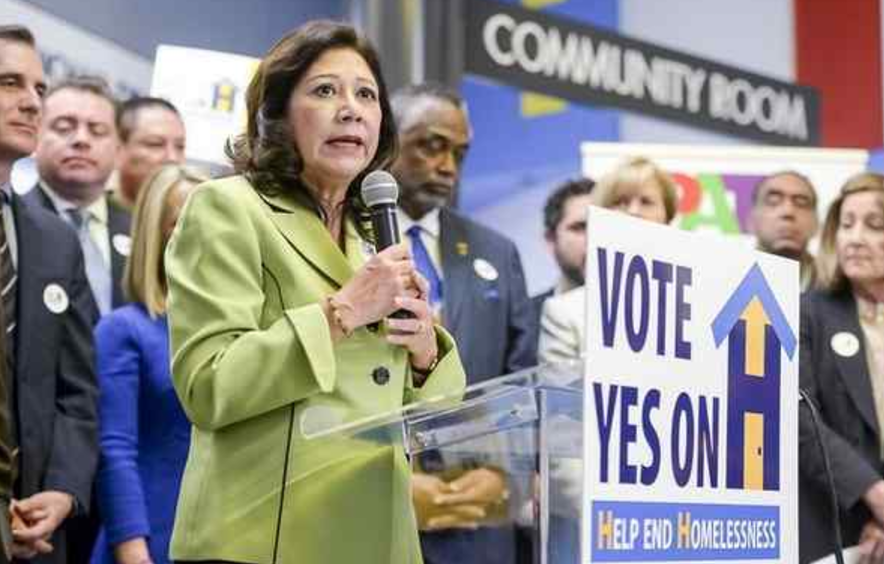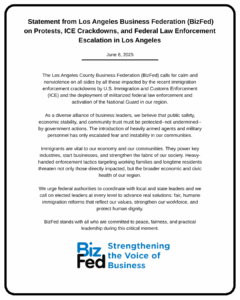By Susan Abram, Los Angeles Daily News
POSTED: 01/30/17, 9:24 PM PST
(Photo by David Crane, Los Angeles Daily News/SCNG)
Just a few blocks from where homeless encampments stretched along Silver Lake Boulevard, Los Angeles city and county officials launched a campaign Monday to encourage voters to approve a sales tax to boost social services to help those who sleep on the streets, in shelters and in their cars.
Called Measure H, the proposed quarter-cent sales tax will be on the March 7 ballot for Los Angeles County voters. The goal is to raise an estimated $355 million a year for 10 years to help homeless people transition into planned affordable housing, officials said.
“The question we have to ask ourselves is not whether or not homelessness is solvable. It is,” Los Angeles Mayor Eric Garcetti said at a news conference. “The question is, will we do something about it, a question we’re asking ourselves these days too much. What did we do in moments of crisis? Who are we? Will we step forward?”
Garcetti made those remarks inside the East Hollywood offices of an organization called PATH, or People Assisting The Homeless, where he was joined by members of the Los Angeles County Board of Supervisors, mayors from various cities and providers who lead nonprofit agencies.
In November, Los Angeles city voters passed Proposition HHH, a property tax bond measure that is supposed to raise $1.2 billion to build 10,000 affordable-housing units for the homeless. But the money only funds the bricks and mortar. Garcetti and others said the affordable-housing complexes they plan to build also need “wrap-around services” to help formerly homeless people adapt to living off the streets and, if needed, to treat addictions. That’s where Measure H comes in, Garcetti said.
“From Pomona to Palisades, from Palmdale to (San) Pedro, we have too many unhoused Angelenos,” Garcetti said. “It is unacceptable in Los Angeles. It is unforgivable if we do nothing about it.”
An estimated 47,000 people are considered homeless in Los Angeles County on any given night, according to results of a count overseen by the Los Angeles Homeless Services Authority.
The gradual increase of men, women and children sleeping on the streets and in shelters prompted the city and county in 2015 to declare homelessness an emergency. The city and county dedicated $100 million each to bolster rapid re-housing and other programs.
But Garcetti and county officials said it’s too expensive to continue to rely on law enforcement to help the homeless.
“We are facing a crisis,” Los Angeles County Supervisor Janice Hahn said. “Homelessness is already costing us taxpayers in ways that are more painful and less productive.”
Hahn said the Los Angeles County Sheriff’s Department spends $41 million a year on arresting, jailing and providing probation services to the homeless, while the LAPD spends $87 million.
A report released last year found that Los Angeles County spent nearly $1 billion on services for homeless people in 2015.
Hahn said the quarter-cent sales tax means consumers would spend 10 cents on the purchase of a $40 sweater or $1 on a $400 television.
Other local leaders said Measure H is a good investment, because it takes the homeless people off the streets and sidewalks, which affects small businesses and tourism.
“Businesses realize that the cost of doing nothing is not nothing,” said Gary Toeb- ben, president and CEO of the Los Angeles Area Chamber of Commerce. “We also realize that investing in the future is essential. Measure H is a wise investment and a smart decision.”
In addition to Proposition HHH, Los Angeles County residents also passed Measure M last November, which added a one-cent sales tax for transit projects.
At least one taxpayers’ rights group said they are not taking a position on Measure H, relying instead on voters to make their own decision.
“The voters seem to like taxes,” said Kris Vosburgh, executive director of the Howard Jarvis Taxpayers Association. “If there’s a downside we’ve already pushed the middle class out of the Los Angeles area and one of the reasons is high taxes. People should realize these taxes are long-term and taxes run up the costs of everything.”

